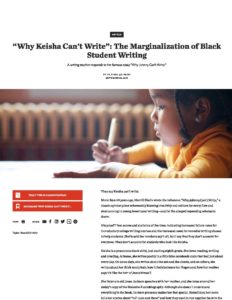“Why Keisha Can’t Write”: The Marginalization of Black Student Writing
Author: Dr. Kiara Lee-Heart
Summary: A writing teacher responds to the famous essay “Why Johnny Can’t Write,” emphasizing the ways that its push for standardization has been particularly damaging for black students.
Original Date of Publication: September 26, 2018
Excerpt
Keisha sits down to write an essay for class. Her writing voice is descriptive and rich with culture. Her writing has its own flavor. It has a particular cadence to it too; it reads almost like a ballad. She writes about her wooly hair and how kids tease her about it. She writes about her love for herself and describes it as a constant battle. When her mother reads it, she can smell the sweet cocoa butter used to moisturize her hair, and she can taste the bitter pain her daughter regularly feels as her classmates react to her blackness. It is clear: The child has a way with words.
As a college writing instructor, I’ve had the pleasure of meeting many students of color who excel in writing. Some use description so vividly that their words come to life on my desk as I grade. Others produce work so concise that I know every word was hand-picked. Ironically, these same scholars often share how they’ve been told that they can’t write, how in high school they were told they should take remedial classes. The essence of “Why Johnny Can’t Write”—an intolerance for diversity and creativity and an inclination toward standardization and the rote—has the power to stop brilliant writing before it even starts. Students like Keisha must be given a chance to see their potential before the dream-crushers convince them to believe otherwise.
Related Resources
- Meeting the Needs of Racially and Linguistically Diverse Students through Courageous Conversations
- Honoring Dialect and Culture: Pathways to Student Success on High-Stakes Writing Assessments
Original Source: Teaching Tolerance, https://www.tolerance.org/magazine/why-keisha-cant-write-the-marginalization-of-black-student-writing


